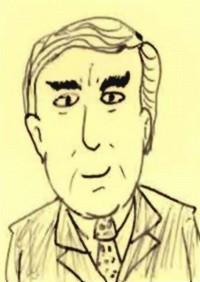XII - Robert Menzies (again)
Following Chifley's use of the army to break up a coal miners' strike in August of 1949 and with the House of Representatives being expanded from 74 to 121 seats, Menzies was able to exploit an anti-communist sentiment and was swept to power convincingly. Chifley had announced intentions to nationalise the banking sector and this in a climate of hope following on from a period of war, made the Labor party look suspicious.
Despite the Liberal/Country coalition holding a 74 to 47 majority in the House of Representatives, Labor still held a 34 to 26 majority in the Senate.
Menzies' government was frustrated in passing legislation and so hoped to gain an election trigger by introducing a bill to ban the Communist Party of Australia which surprisingly had picked up 2% of the vote. To Menzies' confusion and further frustration, Labour passed the bill and it would have been enacted had the High Court not ruled it as unconstitutional.
Menzies fear of the Communist Party was understandable. Whilst on holiday in England in 1948, the Soviet Union blocked the Western Allies' access to West Berlin via rail and road. In response, an airlift was organised which flew supplies into West Berlin. This coupled with the annexation of Poland, Czechoslovakia, Romania and Bulgaria was the cause of real concern.
Instead, Menzies' was able to secure a double dissolution election by trying to pass banking regulations which failed in the Senate. Although 5 seats changed hands in the House of Representatives, Menzies gained majority in the Senate which made life easier. Menzies' subsequent c through a referendum in September 1951, failed though.
Menzies' governments would go on to win the next seven elections in 1953, 1954, 1955, 1958, 1961, and 1963, but to gloss over a period of 16 years as Prime Minister is to do the man an injustice.
With help from the Stalinist USSR and Communist China, hostilities broke out on the Korean peninsula between the two separate governments which had tried to establish legitimacy. When war broke out in June 1950, Australian units which had been based in Japan were moved to Korea; Australia was the second nation behind the United States to commit its military to fighting in Korea. The Korean War would come to a ceasefire in 1953 but has still never been formally resolved.
In the midst of this, Menzies' Government entered into the ANZUS Pact with the United States and New Zealand and the treaty has very much shaped Australia's military policy ever since.
Menzies' Governments would also be in power during the Indo–Malaysian Confrontation from 1962-66 and when the Vietnam War broke out in 1962.
Before the 1954 election though, a Soviet diplomat named Vladimir Petrov announced his defection from the USSR and that there was evidence of a Soviet spy ring operating out of Australia. Given that the referendum in 1951 (which had failed) was defection from the USSR, this announcement played well and Menzies was returned to government easily.
In 1959 Reserve Bank Act, finally freed the central banking functions from the Commonwealth Bank and in its place set up the Reserve Bank of Australia; which also included the responsibility of issuing currency. In 1960, the Reserve Bank opened up more flexible interest rates and this allowed them to enact more fluid monetary policy.
Menzies' governments saw the world change vastly with the introduction of television in 1956, a shift in focus of trade from Britain to the US and legislation which saw Australia decimalise the currency and replace the Australian Pound with a new Australian Dollar.
Being Prime Minister for a shade over 16 years, he saw off Labor oppositions led by Dr Herbert Evatt and Arthur Calwell and when he finally resigned as prime minister on Australia Day 1966, he was the oldest person to have ever been Prime Minister. His replacement Harold Holt, had been Treasurer for eight years and this was seen as a logical progression.


No comments:
Post a Comment